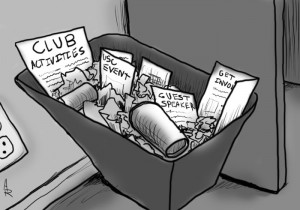Apathy lies with students, not school
Our Google generation often catches a lot of unfounded flak. We’re called impatient, narcissistic, disrespectful, self-involved and noticeably lacking in empathy. Now the Association of American Colleges and Universities seeks to parry some of the criticism heaped upon us and instead admonish higher education for failing its students.
But as much as we’d like them to be right, their defense is — this time — misdirected.
On Sept. 16, AAC&U released a study on how students accept perspectives different from their own in a report entitled “Engaging Diverse Viewpoints: What Is the Campus Climate for Perspective-Taking?” The survey included more than 24,000 students and 9,000 campus professionals across the United States. Follow-up research examined the disparity between the perceived need for engaging — not merely allowing — differences and the campus reality.
According to the report, 58.4 percent of students and 77.3 percent of campus professionals “strongly agreed that … [recognizing] the importance of taking the perspectives of others seriously should be a major focus of their campuses.” Only 32.5 percent of students “strongly agreed that their institutions currently made perspective-taking a major focus.”
The final conclusion disparages universities for not providing key opportunities to guide students toward more open-minded perspectives. However, the study did not mention the problem of student motivation.
USC spoils us with a grand array of cocurricular options specifically intended to evoke probing, open-ended questions. I sat in on a Sept. 21 event from The College Common’s Uncommon Conversations series on “Rethinking the Human.” Titled “What Is It Like To Be a Bat?,” the event, hosted by the College of Letters, Arts & Sciences, proved to be a fascinating interdisciplinary venture into whether people can understand what it is like to be an animal.
If you happened to miss that one, don’t worry; a whole battalion is lined up in the coming year. But sadly, only 30 or so people were present, many of whom were not students.
Even though USC hosts a constant stream of creative events, it doesn’t always feel that way.
Students tend to naturally cluster in homogenous groups, safe within our bubbles of comfort and familiarity. We sign up to try 20 new activities, but end up funneling into organizations similar to our preexisting interests.
In fact, in the study, more than 40 percent of respondents “strongly agreed” that faculty and classes promoted the “importance of considering diverse intellectual viewpoints … and new and challenging ideas or perspectives.” Conversely, just more than one-third strongly agreed that students “advocate the need for other students to respect perspectives different from their own.”
We need to push ourselves to escape our individualistic tunnel vision. Why don’t we make more diverse friends, talk to our professors during office hours, participate in more community service or experiment more with new ideas? It’s time to expand our horizons.
Hopefully when the next speaker comes for the Global Health Lecture Series, the What Matters to Me and Why series, the Annenberg Research Seminar series or the tens of others, the venues will be standing-room only.
But it’s ultimately up to students to attend. USC delivers a deliciously diverse range of ideas on silver platters. All we need to do is pick them up, quietly mull them over and savor them slowly.
Mark your calendars.
Rebecca Gao is a freshman majoring in global health.


Thank you, I’m glad you wrote this!
The accompanying cartoon basically says it all. I get Visions & Voices updates, guest library speakers, other guests affiliated with clubs… and on the rare occasion I manage to break my routine and go attend one, I’m one of very few kids at the events. Given the size of our student body, I’m always a bit surprised at this. While getting a liberal arts degree doesn’t exactly guarantee my employment, the perspective I’ve gained at school here has been well worth it, and I wouldn’t trade it for anything in the world. USC has made these opportunities available, and as my senior year speeds by I wish I’d been more engaged in the university community for the past three.
Hell, I’ve still got a semester and a half.